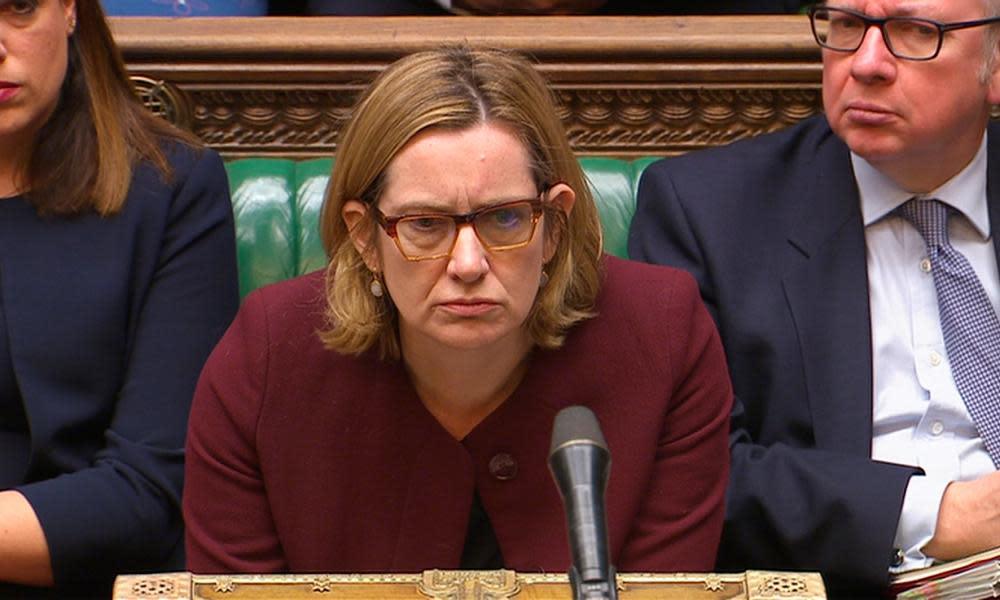It’s a bit late for Amber Rudd to be ‘heartbroken’ over anything

“Heartbreaking,” the home secretary calls the Windrush cases. To a mother whose son died in fear of unjust deportation, or a man denied urgent cancer treatment, “heartbreaking” is the right word. But Theresa May’s “sorry for any anxiety that has been caused” better reflects this government’s heart.
Amber Rudd, in her car-crash replies to Yvette Cooper’s forensic questioning on Wednesday, was forced to admit that she had a target for removals: this year it is 12,000 people. Today’s official line from Matt Hancock, the all-purpose Today programme minister, is: “It has never been Home Office policy to take decisions arbitrarily to meet the target.” But from inside the Home Office comes evidence that hard targets were pinned on immigration officers’ walls. Of course they went after “low-hanging fruit”, those easy to find because they had lived here for ever, paying income tax and council tax; the older, the easier. Gotcha!
Either the home secretary ignored the inevitable cruelty in chasing her targets – or she was too dumb to ask. True, Border Force staff told me that Rudd had had the wool pulled over her eyes about its state of dereliction. When she first visited Heathrow, managers bussed in apprentice tax-collectors from Newcastle to staff the passport kiosks, with passengers held back in another hall so that she saw no queues.
She might use the Henry II get-out clause: she asked for 12,000 deportations – but she never meant cruelty. “This should never have been allowed to happen,” she says now. But has she visited Yarls Wood detention centre unannounced? Presumably she doesn’t read the Guardian and so missed all of Amelia Gentleman’s searing reports on Windrush families over many months.
So what finally broke her heart? The embarrassment of 12 Caribbean heads of state at the Commonwealth heads of government conference demanding a meeting, perhaps. Or David Lammy collecting the signatures of 140 MPs outraged by Windrush cases they tried to raise. But might the heartbreak moment really have come when the Daily Mail finally took up the Windrush stories (with scant acknowledgment of Amelia’s reporting)?
Breaking this government’s stone heart has proved impossible over the years. As £30bn and then another £12bn were gouged from the social security budget, the devastating effects on families, on disabled people, on children, had no impact. Instead the government heaped abuse on victims, as Iain Duncan Smith vowed to end the “something-for-nothing culture”. Never admitting most people on benefits are in work, he liked warning them: “This is not an easy life any more, chum. I think you’re a slacker.” He denied his strict targets for knocking people off benefits: but jobcentre staff showed me what were called ”spinning plates” monthly targets, with one telling me: “You park your conscience when you work here.” Staff missing their quota were disciplined. The easiest hits were people with learning disabilities or mental illness, and benefits were stopped for tiny infractions. Did anyone in government break their heart over diabetic ex-soldier David Clapson, who starved to death when his benefits were stopped?
George Osborne relentlessly sneered at households sleeping on with “closed blinds while honest citizens set off to work”. Now his Evening Standard begs for charity for London’s hungry children, impoverished by him: the Institute for Fiscal Studies warns that another 1.2 million children are falling into poverty.
It never broke their hearts to punish families with more than two children, or cut rent support, or evict anyone with a spare room, sending them sometimes hundreds of miles from schools, jobs, friends and family. It didn’t break their hearts to see more than 50,000 Motability cars taken from disabled households. Would it break their hearts to see people with children using food banks?
Tory MPs know all this. I have sat in their surgeries to see how they react to the stream of human suffering they are inflicting. They look sorrowful, and promise to write (useless) letters to ministers. They get pleas for help from people being evicted and frail old people neglected at home for lack of care. They see children’s centres closing, and the soaring numbers of children taken into care because no one caught family problems early. They hear from patients in pain or danger through operations postponed. Maybe they complain about 600,000 lost young people, hanging around neither in education nor employment, with youth services having been abolished.
A “hostile environment” is what the government has deliberately created. Calculated cruelty has been policy, not accident. Writing about all this state-inflicted suffering can feel like banging your head against a brick wall: Guardian readers know it already, while government ministers don’t give a damn. Is Amber Rudd’s “heartbreak” a moment of great collective epiphany? Will a frozen dam of tears suddenly be unleashed? Theresa May’s “burning social injustices” burn brighter than ever, with no sign yet of an outbreak of howling repentance along the government benches.
• Polly Toynbee is a Guardian columnist

 Yahoo News
Yahoo News 
